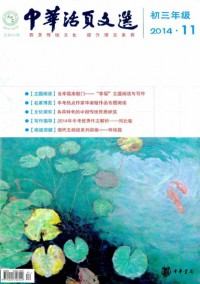初三英语重点难点解析
前言:本站为你精心整理了初三英语重点难点解析范文,希望能为你的创作提供参考价值,我们的客服老师可以帮助你提供个性化的参考范文,欢迎咨询。

一、提出建议并能作出恰当的回答
在第二册第6单元已经学到过用“shall”,“Let’s”和“whynot”来提出建议,并作简略回答。
如:
①-Shallwegoatten?
-Goodidea!
②-Let''''sgoatten?
-OK!
③-Whynotgoatten?-Allright.
这一单元里,主要学习有关“hadbetter”的用法。“hadbetter+动词原形”表示“最好做某事”,用来向别人提出建议,其形式可以缩写为“dbetter”。如:
①You''''dbetterdoyourhomeworknow.
②We''''dbettergotoschool.
“hadbetter”的否定形式为“hadbetternot…”如:You''''dbetternotwatchTVnow.
二、学习过去进行时的各种句式
在前一单元里,已经学习了过去进行时的构成和用法,这一单元着重学习它的否定句式、一般疑问句式及在从句中的用法。
1.过去进行时的否定式在助动词“be(was或were)”后面加上“not”即可。如:
Iwasnotwashingclotheslastnight.
2.过去进行时的一般疑问句式为:助动词“was或were”在句首。如:
—WasTomwritingaletteratsevenyesterday?
—Yes,hewas.(No,hewasn''''t.)
3.在含“when”和“while”(当……时)引导的时间状语从句的复合句中,常有过去进行时,表示一个动作在过去某一时刻或一段时间内正在进行或发生。这一过去进行时的动作可以出现在主句,也可以出现在从句中,但要注意的是,用该时态的动词常常是一个持续性动词。如:
①SomeoneknockedatthedoorwhenIwascook-ing
②Whileweweretalking,mymothercamein.
③Thetwinsweresweepingthefloorwhentheirmotherreturned.
另外,含“when”的复合句中,主句用过去进行时,从句用一般过去时的情况下,常包含有“意外”之概念,如前例③。
三、重点、难点词组和句子的分析
1.Youlooktiredtoday.(2.17)(你看上去很累。)
该句中的“look”意为“看起来”,是系动词,而在这种系动词后面常用形容词作表语如lookyoung/hapy/old/…等,另外,“look”也可用作实义动词,并且有许多相关词组,如:lookat…(看…)looklike…(看起来像……),lookthesame(看起来很相像),lookfor…(寻找……),lookafter…(照料/照看……)等等。当然,不能再用形容词来作表语或修饰它,如果要修饰,只能用副词。如:
Pleaselookafteryourwatchcarefull.
2.Awomansawithappenwhenshewaswalkingpast.(L17)
表示感觉的动词如“see,hear,watch”等以及一些其它动词如“make,let”等,后接不定式作其宾语补足语时,该不定式前不带“to”。如:
①I’mtired.Letmehaveashortrest.
②DoyouoftenhearTomsingthissong?
③Isawhimgoout.(我看到他出去了。)
另外,“see,hear,watch”等还可后接现在分词作其宾语补足语。如:
Iheardsomeonelaughing.(我听到有人在笑。)
3.ThechildrenwereleavingschoolonTues-daywhentheysawatruck.(2.18)
该句中有二点需要注意:
①“wereleaving”是过去进行时的形式表示过去将来的动作,即“正要离开……”。在英语中,个别动词如:“leave,go,come,start”等,它们的进行时形式可以表示一个最近按计划或安排要进行的动作。如:
Areyougoinghomenextweek?
②“leaveschool表示“(学生)离校;毕业”;中间不加冠词。又如;gotoschool/cometoschool(上学)。类似的表达法如:inhospita1(住院),leavehospital/comeoutofhospita1(出院)。注意比较下句中冠词的区别;
Hismotheroftengoesto____theschooltoseeherson
at______school.
4.Hedidnotseethebaguntilitwastoolate:(L18)
“not…until…”是“直到……才……”如:
①.Shewon.''''tgoawayuntilyoupromise,tohelpher.
②.Ididn''''tgohomeuntilIfinishedcleaningtheclassroom.
5.It''''sreallyniceofyou.(L18)
该句相当于“It''''sverykindofyou.”(你真好。)
6.Hetoldherabouttheaccident.(L18)“tellsb.about/ofsth.”意为:“告诉某有关某事或跟某人讲述某事”。如:
Pleasetellmeaboutyourfamily.
另外,“tellsb.sth./tellsth.tosb.”“告诉某人某事”,“tellsb.todosth.”:“叫某人做某事”。如:
①Itoldhimmyname.
②Mygrandfartheroftentoldusstorieswhenwewerechildren.
③Shetoldthehappynewstoeveryone.
④Tellhimtowaitformeattheschoolgate.
7.Pleasehurryup!(L18)
Misszhaohurriedofftolookaftertheman.(L18)“hurryup”;“赶快”;“hurryoff”;“匆匆离去”如:
①Hurryup,oryou''''llbelateforschool.
②Tomfinishedtheworkandhurriedoff.
8.Giveshortanswerstothesequestions.(L20)
一般地,在表示“……的”时,可以用以下四种形式:
①''''s:通常在表有生命的事物后,以“s”结尾的复数名词只加“’”即可。如:
Tom''''scoat.Teachers''''Day,Children''''sDay等。
另外,一些无生命的如表示“时间、城镇”等的名词后,也可加“s''''”。如:
Tomorrow''''smeeting,thecity''''sstreets,etc.
②of:通常是与无生命事物的名词相连。如:
PartsofChina,aphotoofmyfamily
③to:一些表达法已成为习惯,有时我们可理解为配套的事物。如:thekeytothedoor,answerstothequestions.
④形容词性物主代词置于名词前。如:mybook.
Unit6.Inthelibrary
一、语法:现在完成时(一)
1、构成:助动词have/has+动词的过去分词
2、主要用法:(一)动作发生在过去,对现在留有影响,可以与到现在为止的时间状语thesedays,up
tonow,recently,inthelasttwoyears连用,也可以与一些表示强调的副词aleady,yet,just,before,ever…eg.连用:Ihave(already)seenthefilm.
Haveyoueverbeenthere(before)?
注意:A、动词过去分词的变化有两种,一种与过去式的规则变化一样(即在动词后加ed);另一种为不规则变化,需要熟读熟记。规则变化如下:
1)动词原形加ed,如:work--worked
2)以e结尾加d,如:like--liked
3)以辅音字母加y结尾的动词,变y为i,再加ed,如:worry--worried
4)以重读闭音节结尾,词尾只有一个辅音字母的动词,双写这个辅音字母再加ed,如:stop--stopped
B.现在完成时与一般过去时的区别在于:一般过去时只单纯表示过去的动作和状态,与现在无任何联系,时间状语常为:yesterday,lastweek,3daysago,in1990;现在完成时则强调动作与现在的联系、影响和结果。
eg.Haveyouseenthefilm?Yes,Ihave.
Whendidyouseeit?Isawitlastweek.
二、词汇与句型
havegot=have
1.IthinkI''''vegotone.{
hasgot=has
2.Hereyouare.这是一种倒装语序,常用在口语中。
CanIuseyourpenforawhile?
eg.{
Certainly.Hereyouare.
类似的还有:Theregoesthebell.
Herecomesthebus.
3.Haveyouseenitanywhere?
anywhere常用于疑问句和否定句;somewhere表示某个地方,常用于肯定句;nowhere=notanywhere,everywhene,是处处、到处的意思。
eg.Ican''''tfindmypenanywhere.
Hehasborrowedsomemoneysomewhere.
Ihavelookedformylostbikeeverywhere.
Wherelikesthemtoborrowthem.
{
Nowhere.
4.Shealsolikesthemtoborrowthem.
borrow:借来,借进,与form连用。
词组:borrowsth.fromsb.
{
lend:借来,与to连用。词组:
{lendsb.sth.lendsth.tosb.
eg.Whomhaveyouborrowedthebikefrom?
Canyoulendmeyourbike?
wifhsb.
5.Sheisverystrict,bestrict{
insth.
eg.Sheisstrictinherjob.
Ourteacherisstrictwithus.
6.Pleasebemorecarefulfromnowon.
fromnowon:从现在起,还有fromtomorrowon,fromthenon,fromnextweekon.
7.Ihaveneverlostabookbefore.ago与before都是副词,前者用于过去时,后者用于现在完成时,泛指以前。
eg.Ilostmypenthreedaysago.
Ihaven''''tseensuchagoodfilmbefore.
8.WemustboththankLucy!注意both,all,each作同位语的位置:1.放在be动词后;2.放在行为动词前;3.放在助动词与谓语动词中:
eg.Weareallstudents.Theyhavebothgonethere.
WeeachhaveanEnglishbook.
9.Youmustalwaysreturnyourlibrarybookontime.
return表示giveback,故后面不再跟back.
onatrain
10.{bytrain不能加冠词或任何修饰词,类似的有:inacar,onmybike,
bytrainbybus,bybike,byair…
11.……,youmustpayforit.payforsth.“付…的钱,赔偿…”
eg.Ipaidtwoyuanforthebook.
thinkI''''vegotone.{
hasgot=has
2.Hereyouare.这是一种倒装语序,常用在口语中。
CanIuseyourpenforawhile?
eg.{
Certainly.Hereyouare.
类似的还有:Theregoesthebell.
Herecomesthebus.
3.Haveyouseenitanywhere?
anywhere常用于疑问句和否定句;somewhere表示某个地方,常用于肯定句;nowhere=notanywhere,everywhene,是处处、到处的意思。
eg.Ican''''tfindmypenanywhere.
Hehasborrowedsomemoneysomewhere.
Ihavelookedformylostbikeeverywhere.
Wherelikesthemtoborrowthem.
{
Nowhere.
4.Shealsolikesthemtoborrowthem.
borrow:借来,借进,与form连用。
词组:borrowsth.fromsb.
{
lend:借来,与to连用。词组:
{lendsb.sth.lendsth.tosb.
eg.Whomhaveyouborrowedthebikefrom?
Canyoulendmeyourbike?
wifhsb.
5.Sheisverystrict,bestrict{
insth.
eg.Sheisstrictinherjob.
Ourteacherisstrictwithus.
6.Pleasebemorecarefulfromnowon.
fromnowon:从现在起,还有fromtomorrowon,fromthenon,fromnextweekon.
7.Ihaveneverlostabookbefore.ago与before都是副词,前者用于过去时,后者用于现在完成时,泛指以前。
eg.Ilostmypenthreedaysago.
Ihaven''''tseensuchagoodfilmbefore.
8.WemustboththankLucy!注意both,all,each作同位语的位置:1.放在be动词后;2.放在行为动词前;3.放在助动词与谓语动词中:
eg.Weareallstudents.Theyhavebothgonethere.
WeeachhaveanEnglishbook.
9.Youmustalwaysreturnyourlibrarybookontime.
return表示giveback,故后面不再跟back.
onatrain
10.{bytrain不能加冠词或任何修饰词,类似的有:inacar,onmybike,
bytrainbybus,bybike,byair…
11.……,youmustpayforit.payforsth.“付…的钱,赔偿…”
eg.Ipaidtwoyuanforthebook.

